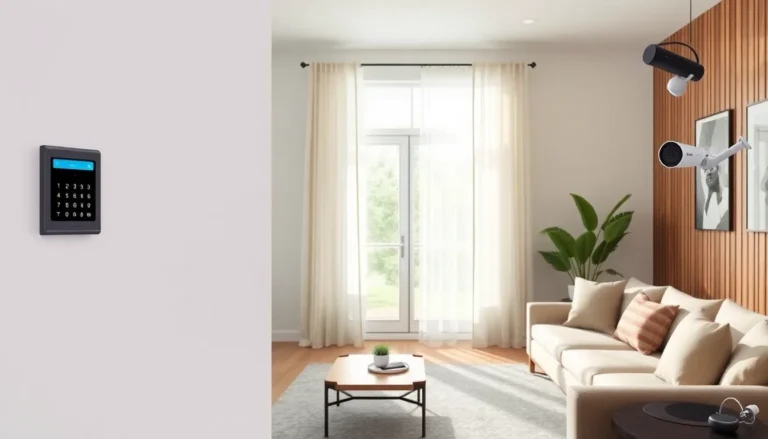In today’s fast-paced world, searching for a new home shouldn’t feel like a scavenger hunt on a reality show. Enter real estate apps, the trusty sidekicks that turn the daunting task of house hunting into a fun, interactive experience. With just a few taps, buyers can browse listings, compare prices, and even take virtual tours—all while sipping their morning coffee in pajamas.
These apps are like having a personal real estate agent in your pocket, minus the awkward small talk. Whether you’re a first-time buyer or a seasoned investor, the right app can make all the difference. So why not let technology do the heavy lifting? Dive into the world of real estate apps and discover how they’re revolutionizing the way people find their dream homes.
Table of Contents
ToggleOverview of Real Estate Apps
Real estate apps streamline the property search process, offering users a range of functionalities. Users can browse extensive listings, making it easy to find homes that match specific criteria. Offering features like price comparisons, these apps empower users to make informed decisions. Virtual tours enhance the experience by allowing potential buyers to view properties without leaving their homes.
Investment tracking enables seasoned investors to monitor property values and trends efficiently. Many platforms provide tools for mortgage calculation, helping users understand potential financing options. Detailed neighborhood insights in these apps give a comprehensive overview of local amenities, schools, and demographics.
User-friendly interfaces ensure that navigating through listings remains straightforward. Notifications alert users to new listings that meet their preferences, keeping them updated in real time. Customer support features often include chat options, providing immediate answers to questions.
Favoring a community-driven approach, reviews and ratings enhance transparency, helping users gauge the credibility of listings and agents. Integration with social media platforms allows for easy sharing of properties, expanding the reach of listings.
Mobile optimization ensures that users can access these apps seamlessly from smartphones and tablets. Favorable security measures protect user information, fostering trust and confidentiality. As technology continues to evolve, real estate apps adapt, adding innovative features that enhance the buying experience.
Key Features of Real Estate Apps

Real estate apps offer powerful features that enhance the property search experience. These functionalities make the home-buying process efficient and user-friendly.
Property Search and Filters
Advanced search options enable users to find properties based on various criteria such as location, price range, and property type. Filters provide the flexibility to narrow down listings, ensuring buyers easily locate homes that meet their specific needs. Instant updates on new properties that fit chosen parameters keep users informed. Maps integrate seamlessly, helping to visualize property locations and nearby amenities. User-generated reviews add context and insight into neighborhood characteristics, further guiding potential buyers in their decision-making.
Market Analytics and Trends
Real estate apps deliver valuable market analytics that aid users in assessing property values. Comparative market analysis tools offer insights into local pricing trends and help gauge investment potential. Historical data tracking allows users to see how property values have shifted over time. Market forecasts provide predictions based on current trends, supporting informed investment decisions. These analytics enhance the ability to make sound financial choices by equipping users with data-driven insights.
Top Real Estate Apps
Real estate apps offer significant advantages for buyers and investors. Below are some popular options that stand out for their unique features and benefits.
App 1: Features and Benefits
Zillow provides a vast database of property listings. Users can access accurate home prices and sales history. In addition, the app features neighborhood insights, including school ratings and local amenities. Notifications alert users to new listings matching their criteria. Zillow also includes tools for mortgage calculations and affordability estimates, simplifying the financial aspect of buying a home.
App 2: Features and Benefits
Realtor.com connects users directly to MLS listings, ensuring they see the most up-to-date properties. The app includes detailed filters for searching by price, number of bedrooms, and other categories. Virtual tours enhance user experience, allowing potential buyers to explore homes remotely. Furthermore, Realtor.com offers a unique feature called ‘Price Change Alerts’ to notify users when prices drop on their saved properties. This function supports decision-making in a competitive market.
App 3: Features and Benefits
Redfin stands out with its user-friendly interface and powerful search tools. Comprehensive neighborhood data is readily available, allowing users to assess community dynamics. Real-time updates provide instant alerts for new listings, ensuring users never miss a potential opportunity. Redfin also features a home value estimator based on recent sales and market trends. This valuable insight helps buyers and investors make informed choices when navigating the real estate landscape.
User Experience and Interface
Real estate apps prioritize user experience with intuitive designs and functionality tailored to meet users’ needs. Seamless interactions enhance engagement and satisfaction.
Ease of Navigation
Effective navigation significantly impacts the user’s journey through a real estate app. Users expect straightforward pathways to find listings, with clear labels and well-structured menus. Filtering options enable users to refine searches by criteria such as price, location, and property type, leading to quick access to relevant properties. The inclusion of saved searches simplifies return visits, allowing users to revisit preferred listings effortlessly. Furthermore, integrated maps provide easy visualization of property locations and nearby amenities, elevating the overall navigation experience.
Design Considerations
Design plays a crucial role in the effectiveness of real estate apps. Clean layouts with ample white space enhance readability and focus, allowing users to absorb information quickly. Color schemes should reflect a professional yet inviting tone, appealing to both buyers and sellers. Each element, from buttons to icons, should facilitate interactions and intuitiveness. Responsive design ensures the app functions well across various devices, maintaining usability whether on a smartphone or tablet. Additionally, incorporating feedback features enables users to suggest improvements, fostering a community-centric approach to design evolution.
Real estate apps are revolutionizing the way people approach home buying and investing. Their ability to simplify the search process and provide valuable insights makes them indispensable tools in today’s market. Users can enjoy personalized experiences with features that cater to their specific needs and preferences.
As technology continues to advance, these apps will likely evolve even further, enhancing their functionalities and user experiences. Embracing these digital tools not only saves time but also empowers users to make informed decisions. With the right app, finding a dream home or a profitable investment becomes an achievable goal.



